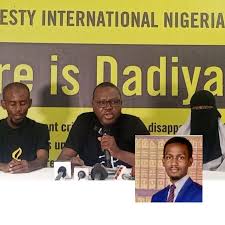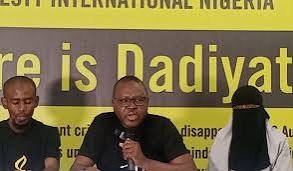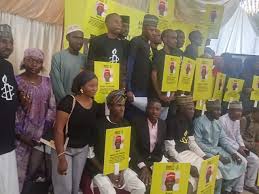
Iliyasu Abdullahi Bah
Six years after the abduction of Abubakar Idris, widely known as Dadiyata, from his Kaduna residence, his family and Amnesty International have decried the Federal Government’s “deafening silence and shameful inaction” in resolving the activist’s disappearance.
At a solemn press conference in Kaduna marking the sixth anniversary, Amnesty International’s Country Director, Isa Sanusi, framed Dadiyata’s case as symptomatic of Nigeria’s escalating crackdown on dissent. Speaking with visible emotion, he said:
“His family waited that night, praying for his return. They waited days, weeks, months—now six agonizing years. Amnesty asks: Where is Dadiyata?”
Sanusi lambasted the security agencies—particularly the Nigeria Police and the DSS—for their “weak, weightless promises” and blatant indifference.
“No credible updates, no official reports, no accountability—just a shameful, crushing silence,” he said, describing the case as an instance of “enforced disappearance,” a notorious tactic of authoritarian regimes to silence critics.

The pain of Dadiyata’s family was laid bare by his brother, Usman Idris, who recounted their devastating ordeal:
“Our mother died heartbroken, clinging to false hope. Our uncle succumbed to grief. Now, our father barely survives each day.”
He added that the family’s desperate appeals to the Inspector-General of Police, DSS Director-General, and Attorney-General have yielded nothing—“not a single credible explanation or apology has been offered in six years.”
Dadiyata’s wife, Khadija Ahmad Lame, shattered the room into silence as she wept:
“Our children ask daily, ‘Where is Daddy?’ I have no answers. Six years of torment, six years of unanswered cries.”
Dadiyata, a university lecturer and fearless government critic, was abducted on August 2, 2019, by masked assailants who stormed his Barnawa home, bundled him into his own vehicle—which vanished alongside him.
Amnesty asserts that his case is “tragically unremarkable in a country where dissent is increasingly met with repression.”
The trend of targeting activists continues to erode civic space in Nigeria.
In another incident, Okwuluorah from Enugu State was reportedly abducted in Umuaka, Orlu Local Government Area of Imo State, just a few kilometres from a military checkpoint. Reacting to the incident, human rights lawyer Ejiofor said:
“Okwuluorah was not abducted by strangers but by those who live within. The South-East region is bleeding, and its wounds are self-inflicted.”
Agba Jalingo, the publisher of CrossRiverWatch, was arrested by the Nigeria Police in 2019, 2022, and 2023. He faced multiple charges, including terrorism, treasonable felony, and an attempt to topple the Cross River State Government. He spent 34 days in jail before his trial even began in 2019.
Similarly, Omoyele Sowore—a presidential candidate in the 2019 elections and prominent activist—was arrested by the Department of State Services (DSS) on August 3, 2019, in Lagos after calling for nationwide protests under the #RevolutionNow movement.

In 2025, the Policy and Legal Advocacy Centre (PLAC) described Sowore as a “prominent human rights and democracy activist.” The Centre expressed concern over his latest charge under cybercrime laws, calling it “a clear misuse of legal provisions intended to combat genuine cyber threats.”
PLAC stated:
“Omoyele Sowore has consistently been a voice for the voiceless, championing justice, accountability, and democratic governance in Nigeria. The latest action by the authorities—to arrest, detain, and intimidate him under the guise of cybercrime—represents an alarming trend of using the law to suppress dissent and silence criticism.”
Such practices, PLAC warned, “undermine the democratic values and fundamental human rights enshrined in the Constitution of the Federal Republic of Nigeria, including freedom of expression, peaceful assembly, and association.”
Amnesty International reaffirmed its commitment to seeking justice for Dadiyata and all Nigerians who have suffered similar abuses. Country Director Sanusi demanded that President Bola Tinubu order an independent probe, stressing that the Buhari administration’s failure to act amounted to complicity.
“Time is running out. Nigeria must stop disappearing its truth tellers,” Sanusi declared.
As Dadiyata’s children grow up fatherless, his unresolved case remains a harrowing testament to the cost of dissent in Nigeria—a country where the powerful silence critical voices, and families are left to mourn in uncertainty.
